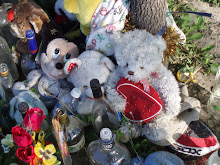I knew very little about special education, and was instantly terrified by the legal responsibility, but also by the knowledge that these students were the most dependent on my abilities, the most specialized in skill sets required to deal with them. All I had to offer them was a worthless seminar that lasted 6 weeks, total of 12 hours, at MSU and teaching in New Orleans. That time was much more instructional, I had two classes of twelve students, each of whom had to take a high stakes test to determine whether or not they could advance from 8th grade to high school. I had a total of 4 students who probably were not special ed, but were in a return from juvenile correction program that made them very difficult to deal with. One of my favorite but most challenging students was named Marcellus, he was very big for an 8th grader and was one of the best junior boxing prospects in the nation. He also was missing a large chunk of his forearm where a police dog had bitten him.
I never found out how many of my students passed the test, and I do not know how to predict their outcomes. They did everything I asked them to do on the whole, I only had two students who were severely disabled (one who could literally not write). But while that experience opened up much to me, it did not make me a master of special ed.
And here I was going to IEP meetings and fulfilling services that I did not understand.
But I do believe in the 14th amendment, that all people have the right to equal protection, and education is inseparable from protection. Especially on Garfield and State.
I share a small office with three women. One is the case manager and 10 year veteran. One has been doing the job for three years in San Diego area, and who is going through their first year in Chicago. The other is a first year teacher.
They were very welcoming and I was very grateful. They refereed to me as their man. The first days I did nothing but sit in their office, read IEPs and occasionally walk around the halls meeting people, who turned out to be the worst students skipping. This served me in some good stead later on.
IEPs are the most inconsistent documents imaginable. Some where very good, others had goals written like "he will use grammar and speak good English". It was also strange reading IEPs about students I had not yet met, had no impression at all of. Read social work notes and learned about terrible things, things that I never would have suspected based on how the kids acted. Read medical notes, prescriptions, incident reports, a narrative that was erratic and legally binding.
My responsibilities were mainly to be an inclusion teacher, to be present in certain classrooms (2 English, 3 Lit, 1 Biology, 1 Physics, 2 Economics) and to help or co-teach. During fourth period I would teach a corrective reading program to teach three high school students how to read for the first time. This responsibility scared me more than anything else. I had no idea how to teach a person to read. I was very lucky in dealing with most of the teachers whose classrooms I shared. They were very welcoming, and seemed to be ok with the fact that I had very little idea of what I was doing.
skip to main |
skip to sidebar








Even in our sleep pain that cannot forget Falls drop by drop upon the heart Until in our own despair Against our will Comes wisdom Through the awful grace of God. Escalus








About Me
- Mr. Boston
- I am now a third year teacher. Before I moved to Chicago I worked in juvenile rehabilitation schools, a suburban school, and was a volunteer teacher for a summer in New Orleans after Hurricane Katrina. I went to Michigan State University. My students think I look like Mr Boston. This really pisses me off.
Index
-
▼
2007
(67)
-
▼
July
(21)
- Why I Teach
- 1st Day at CVS
- Working*
- My First Day in the News (CBS)
- USA Today
- Chicago Sun Times
- First Heartbreak
- "I wish I was white"
- Students
- Violence
- The Facts
- I Kings 3:7
- The Rules of Teaching, Part 1.
- Let Go
- Kierkegaard
- Unemployment
- UPS
- Fall On Your Knees
- ACE TECH
- Rules of Teaching Part 2
- Special Ed
-
▼
July
(21)
What we do for ourselves dies with us.
What we do for others and the world remains and is eternal.
Albert Pine
What we do for others and the world remains and is eternal.
Albert Pine